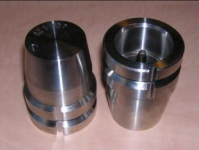The JRC CANDU sealing system (JCSS) and the ultrasonic sealing
bolt (USSB) are systems for underwater sealing that use
ultrasonically verifiable sealing bolts. The sealing bolt replaces
one of the standard bolts of a container lid. It is constructed to
contain a unique random pattern of metal discs and a frangible
element (integrity feature) which breaks when an attempt is made to
remove the seals. Verification is performed by transmitting
ultrasonic pulses through the seal with a suitable transducer and
observing the unique pattern of reflections, and is accomplished by
comparing the pattern obtained upon installation with that obtained
during subsequent in situ checks. Dedicated software guides an
inspector through the installation and verification process and
manages the seals database. When a broken seal is encountered, the
reader detects the absence of the integrity feature and is still
able to confirm the seal's identity.
These types of seal have proved particularly effective for
underwater applications such as for stacks of CANDU fuel bundles
(JCSS) or for bolts closing shipment and storage containers of LWR
spent fuel assemblies (USSB). The main advantages of these seals
are that they are insensitive to radiation, are particularly
reliable even in very harsh environmental conditions and can last
for decades.
(Source: IAEA Safeguards Techniques and Equipment)

JCSS bolt head (Source: IAEA)